Overseas travel of
Malcolm Archbald SMITH
[Ref. S.1]
| Overseas |  |
Photos |
Overseas travel of
Malcolm Archbald SMITH
[Ref. S.1]
| Overseas |  |
Photos |
This last trip on which Malcolm was sent took him to the Sudan. His task was to provide Technical Advice on the erection of Supacom buildings for a construction camp for a new sugar plantation and refinery at Surfeyia. There was an element of worry as civil war was taking place in the southern part of the country.
On 30 August 1977 he flew from Heathrow to Charles de Gaulle airport in Paris. From there he took an Air France service to Khartoum where he arrived in the early evening. Having been through the arrival procedures, he went to the terminal concourse where he was expecting to be met. He could not see any obvious contact person so he waited for a couple of hours until the terminal was almost empty, then was told that the terminal would be closing for the night. There were a couple of Americans remaining so Malcolm managed to arrange a lift into Khartoum with them. Malcolm did not have the address for the company he was to visit so the Americans dropped him off in town and left him to his own devices.
It was about 9pm by now and fairly dark in the absence of street lighting. At one point, Malcolm narrowly avoided stepping into an open manhole where the cover had been removed. The streets were quiet but Malcolm came across a man staggering along the same footpath. Amazingly, the man, who had been drinking, turned out to be the local Office Manager of Capper Neil for whom Malcolm was to work, so he soon found himself at the right place at about 11pm. He was given a bed, but offered no food, and told that he would be taken to the construction site early the following morning.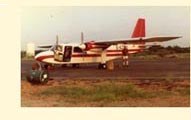
The next stage of the journey was in the company British Norman Islander airplane, leaving at 6:30am. The pilot was a laconic Fin who totally ignored the flap that was going on around him. Malcolm was watching as he loaded the stores onto the plane and asked how he calculated the load and decided how to distribute it. His answered that "if it fell through the bottom of the plane, then there was too much"! Malcolm sat next to the pilot on the flight to the airstrip at Surfeyia.
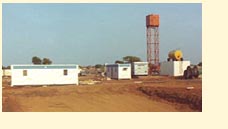 Malcolm was given a billet in one of the existing Lesser Supacom buildings. The building comprised two air-conditioned rooms with a shared shower room in between. Thereafter, Malcolm was shown around the construction area, the principal job in hand being the assembly and fitting out of the Supacom kitchen block. Malcolm's presence on site as an advisor was part of the contract for the supply of the buildings, however, in this case, the staff on site were managing quite well without assistance. Initially, he went around the construction site with some of the supervisors then went to the delivery point where goods were brought in by train.
Malcolm was given a billet in one of the existing Lesser Supacom buildings. The building comprised two air-conditioned rooms with a shared shower room in between. Thereafter, Malcolm was shown around the construction area, the principal job in hand being the assembly and fitting out of the Supacom kitchen block. Malcolm's presence on site as an advisor was part of the contract for the supply of the buildings, however, in this case, the staff on site were managing quite well without assistance. Initially, he went around the construction site with some of the supervisors then went to the delivery point where goods were brought in by train.
The following day Malcolm worked with the team unpacking and erecting the kitchen block. All went well and it was half completed by the end of the day, work pausing at lunchtime when there was a barbecue for the staff. The night sky was adorned by a show of lightning. Work continued on the kitchen building and the shell was completed two days later. The specialist catering equipment started to go in then and Malcolm was able to get involved with that.
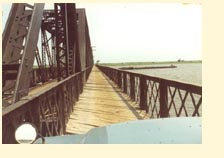 Over the next few days, Malcolm generally pottered about and observed the way of life that went on around the area of the site. Early in the second week, some plumbing items were required so Malcolm and a couple of others took the Landrover to the souk at Kosti. Malcolm was invited to drive some of the way which was probably not wise should anything have gone wrong. The engine of the Landrover would not stop when the ignition was turned off, so it had to be achieved by deliberately stalling the engine. Malcolm didn't quite get it right first time and forgot to keep the brake on so shook everyone else in the Landrover about. On the way back, Malcolm drove across the river bridge which was only a few inches wider than the Landrover, thus quite a challenge.
Over the next few days, Malcolm generally pottered about and observed the way of life that went on around the area of the site. Early in the second week, some plumbing items were required so Malcolm and a couple of others took the Landrover to the souk at Kosti. Malcolm was invited to drive some of the way which was probably not wise should anything have gone wrong. The engine of the Landrover would not stop when the ignition was turned off, so it had to be achieved by deliberately stalling the engine. Malcolm didn't quite get it right first time and forgot to keep the brake on so shook everyone else in the Landrover about. On the way back, Malcolm drove across the river bridge which was only a few inches wider than the Landrover, thus quite a challenge.
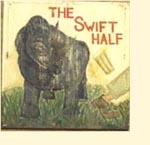 There was a canteen where meals were eaten and social events held. The bar, called the Swift Half, was within that building and an imaginative sign outside registered it's presence. As with most overseas expat camps, the food was good and plentiful, however, once the new kitchen was commissioned and a chef had arrived on site, things got better. The chef had a 40 gallon oil drum cut in half longitudinally to make a large barbecue on which every day he cooked an enormous breakfast comprising every conceivable item one could imagine. On top of that, hot meals were available at lunchtime then there was a plentiful choice of menus in the evening. The temtation was to eat as much as possible but after a few days most of us found that we just could not manage it.
There was a canteen where meals were eaten and social events held. The bar, called the Swift Half, was within that building and an imaginative sign outside registered it's presence. As with most overseas expat camps, the food was good and plentiful, however, once the new kitchen was commissioned and a chef had arrived on site, things got better. The chef had a 40 gallon oil drum cut in half longitudinally to make a large barbecue on which every day he cooked an enormous breakfast comprising every conceivable item one could imagine. On top of that, hot meals were available at lunchtime then there was a plentiful choice of menus in the evening. The temtation was to eat as much as possible but after a few days most of us found that we just could not manage it.
Health was always a concern out in the bush so a doctor was available although he did not speak English. Malcolm arttended him on one occasion as he had severe headache. He found that the doctor did speak French so he used what words he could remember from school to try and explain his condition, describing it as 'a band of iron around my head'. The doctor looked at Malcolm vaguely and gave him a couple of pills, and luckily the pain went away, probably of it's own accord. One of the other expats had caught worms so went to the doctor. He was totally unable to communicate with him so resorted to drawing a picture of a worm then bending over and pointing to his bottom. It is not known what the reaction of the doctor was, but the other expats thought it was hilarious.
The camp being remote, entertainment comprised principally eating, drinking and playing cards, plus a film now and again. There was a regular poker school but this was not a game that Malcolm played. However, the poker champion did play the occasional game of cribbage which was Malcolm's favourite game. Malcolm played him a few times but never managed to win a single game. Most of the staff were on contracts of about two years so the confimenet could lead to frustration and extreme behaviour. One evening in the dining hall, one man suddenly blew up and bellowed his dislike of the food, probably just because he had had a bad day. Such behaviour was usually dealt with firmly under strict rules so he, although being nearly at the end of his tour of duty, was sent home the next day, probably wioth loss of his completion bonus.
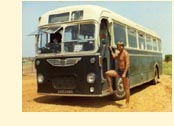 As the construction area was spread about a bit, a bus was provided to transport to and from the living area. It was a former Hants & Dorset single decker, number 833, formerly based at Lymington. It had a regular driver who had been told jokingly that he could not start until the bell was rung, and he did just that. As there were no proper roads, the bus was driven in a direct line between the required stops, consequently it bounced about a bit. Punctures were a perpetual problem and did not always get repaired immediately. The seats got shaken loose and gradually more of them became unfastened and fell over.
As the construction area was spread about a bit, a bus was provided to transport to and from the living area. It was a former Hants & Dorset single decker, number 833, formerly based at Lymington. It had a regular driver who had been told jokingly that he could not start until the bell was rung, and he did just that. As there were no proper roads, the bus was driven in a direct line between the required stops, consequently it bounced about a bit. Punctures were a perpetual problem and did not always get repaired immediately. The seats got shaken loose and gradually more of them became unfastened and fell over.
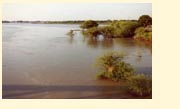 Malcolm did quite a bit of travelling whilst on this contract. He drove into Kosti several times but also went in the company aeroplane a number of times. He went back to the transit house in Khartoum for a couple of days but had nothing to do so he took a look around the city. He went down to the edge of the river Nile then walked to the point where the Blue Nile and White Nile join together. He mentioned this to one of the Sudanese in the house and they said that it was a tradition that if a visitor took a drink of water from the point where the rivers meet, they would return again. Malcolm commented that it was more likely they would never leave as they would probably die from some disease, not being immune. On his last flight back to Khartoum, the plane diverted to follow the railway line as an expected delivery had not arrived so the boss was looking for the train. Seemingly they did get lost.
Malcolm did quite a bit of travelling whilst on this contract. He drove into Kosti several times but also went in the company aeroplane a number of times. He went back to the transit house in Khartoum for a couple of days but had nothing to do so he took a look around the city. He went down to the edge of the river Nile then walked to the point where the Blue Nile and White Nile join together. He mentioned this to one of the Sudanese in the house and they said that it was a tradition that if a visitor took a drink of water from the point where the rivers meet, they would return again. Malcolm commented that it was more likely they would never leave as they would probably die from some disease, not being immune. On his last flight back to Khartoum, the plane diverted to follow the railway line as an expected delivery had not arrived so the boss was looking for the train. Seemingly they did get lost.
Malcolm set off home after two and a half weeks in Sudan. The plane from Khartoum made an intermediate stop in Cairo but passengers were not allowed to disembark. Whilst sitting on the runway, Malcolm observed a squad of 4 soldiers march past the plane, then the first soldier stopped as did the second; the third bumped into the back of the second and the fourth into the third. The plane continued over the Mediterannean sea then over the Alps to Paris where Malcolm transferred to a flight to Heathrow.
| Top of page |